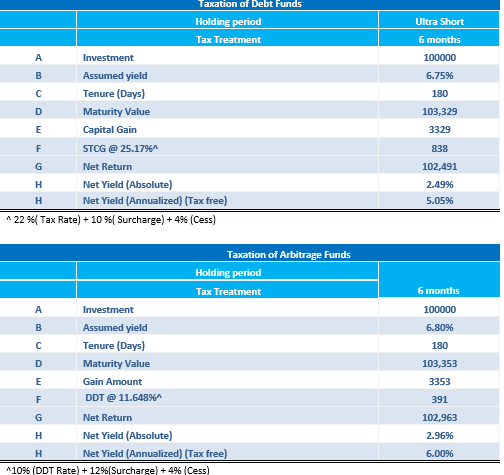Recently, SEBI came out with a circular on risk management framework for liquid and overnight funds in the wake of recent credit events and norms governing investment in short-term deposits.
Here are some key changes:
- Liquid funds shall hold at least 20% of its net assets in liquid assets
- Mutual funds shall levy exit load on investors who exit the liquid fund within 7 days of their
investment
- The cut-off timings for applicability of Net Asset Value (NAV) in respect of purchase of units in liquid and overnight funds shall be 1:30 p.m. instead of 2:00 p.m.
While these changes will lead to a drop in returns for liquid funds, the quality of the portfolio will improve. Since there will be exit load for the funds, break-even point of investments in liquid funds over overnight funds will be 3-4 days to offset the exit load. We recommend 7-day money to be in overnight funds as there will be volatility in liquid funds over very short duration. At this point in time, investors should move up in the duration curve ranging from 3-6 months horizon (ultra short duration funds) as the segment of this yield curve provides better risk adjusted returns.
An Alternate
Arbitrage funds are another category of funds that can be used to park short term funds (Investment horizon of 3 to 6 month) with lower risk and with the tax efficiency of equity funds as an added benefit. These funds invest in the cash and derivative segment of the equity markets for the same security to lock in the price differential in the two markets. Arbitrage funds do not carry the risks associated with investing in equity because the equity positions are hedged. Any fall in the price of the security which will lead to a loss in shares that have been bought in the cash market is offset by a gain in the short position in the futures market. The debt component is not high in arbitrage fund as the fund houses have to keep the average equity exposure above 65% to avail equity taxation benefits.
Volatility in short-term returns can also occur because of the mark-to-market valuation rules. What arbitrage funds do is simultaneously buy in one market and sell in another market to corner the price difference. They are taxed as equity funds with short-term capital gains being taxed at the rate of only 15%. The dividend distribution tax (DDT) applicable on dividends paid is also lower at 10% for arbitrage funds.

Note: Assumed yield in the table above are the average yield for the specific category for the specific tenor.
Bhoopesh Jain is Associate Director at SPA Global Pvt Ltd. The views expressed in this article are solely of the author and do not necessarily reflect the views of Cafemutual.




